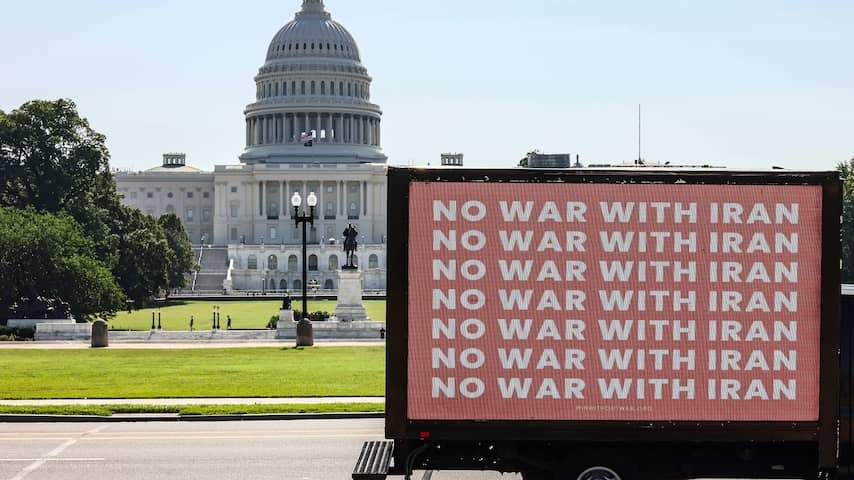
The question of whether the American army will assist Israel in attacks on Iran is increasingly looming over the war between the two countries. Whether it actually comes to that depends entirely on the whims of American President Donald Trump.
During the American election campaign, Trump promised that the United States, under his leadership, would not become involved in a new foreign war. But after suggestive statements from the president, that seems to be a possibility.
American media reported on Wednesday that Trump is considering military support for Israeli attacks. In a message on social media, Trump demanded an “unconditional surrender” from Iran and said his patience with that country “is up.” It is unclear what that support would look like.
With those statements, you have to keep in mind that there may be a unique opportunity for the US. The suspected development of Iranian nuclear weapons can be pushed back significantly with American help. The attacks by Israel have already ensured that the defense of Iran and its allies has been significantly damaged, says America expert Chris Nijhuis to NU.nl. Possibly the risk of counterattacks has therefore decreased.
Israel could still use the support of the US because the Americans possess the heaviest bombs. These are the only bombs that can damage the Fordow nuclear facility. It is located in a bunker deep under a mountain. Damaging it would be necessary to thwart the Iranian nuclear program.
Groups of Republicans Stand Directly Opposed to Each Other
Are Trump’s words not in conflict with his promise during the campaign about wars? According to Nijhuis, we should not take that promise too seriously.
“Trump defines war in a different way,” says Nijhuis. “If it happens, he will try to sell it as a one-time action, as a response to what Iran has done.” As long as it does not result in a longer conflict, he would probably still be able to sell that to his supporters.
Nijhuis draws a comparison with the attack on Iranian General Qassem Soleimani in Iraq by the American army in early 2020. Even during his first term as president, Trump promised not to interfere in foreign conflicts. But within that promise, he still saw room for such military operations in the Middle East.
It is a consequence of the different viewpoints that exist within the Republican Party. On the one hand, there is a group of Republicans who want the US to interfere as little as possible in foreign conflicts, says historian Jack Thompson.
That group points to the wars in Iraq and Afghanistan, where the American army was ultimately involved for a long time. “They say: this is not our war, Israel can defend itself,” Thompson explains.
In contrast, there are Republicans who believe that the US should offer Israel almost unconditional help. For them, it is a thorn in the side that Iran may be developing a nuclear weapon.
Moreover, preventing Iran from getting a nuclear weapon is ALSO a promise from Trump, says historian Andrew Gawthorpe. Another important promise that plays a role is that of unconditional American support for Israel. More about the different viewpoints within the Republican Party can be seen in this video:
 2:27
2:27
Clash Among Trump Supporters: Is Meddling in Iran Really ‘America First?’
Impulsive Trump Must Assess Risks
Experts find it difficult to estimate whether Trump will ultimately REALLY opt for military involvement in the attack on Iran. What also plays a role is that Trump is not a strategist, but relies on impulses in his decisions. “The person who talks to him at the last moment can change his final decision,” Thompson illustrates.
Trump and his government will also make an assessment in a different way. Despite Iran having suffered a lot of damage, the Americans still have to determine how much risk they want to take by helping Israel. It is about risks from Iran, but also about the risks regarding support in the US for Trump.
American interference can have different consequences, says Gawthorpe. For example, American involvement can lead to a quick victory.
Trump Can Lose Support of Supporters
Experience shows that Americans often shrug their shoulders at ‘smaller’ actions by the army. Most of Trump’s supporters will accept participation in the attack on Iran, even those who are against interference in foreign conflicts. “They say: we don’t like it, but it’s over AND Iran doesn’t get nuclear weapons,” says Gawthorpe.
But if American involvement results in a longer conflict, Trump runs the risk of support for him crumbling. Especially if the result is that attacks are carried out on American soldiers, or possibly even civilians become targets.
Trump is less reluctant to take unpopular measures in his second term as president, says Nijhuis. For example, Trump has already introduced import duties and started large-scale expulsions of migrants. “He is more resistant to the pressure of public opinion than in his first term. Then he regularly withdrew measures as soon as he noticed that they were not popular.”